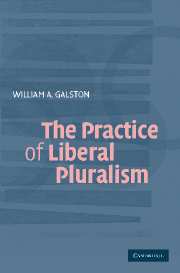Book contents
- Frontmatter
- Contents
- Acknowledgments
- 1 Introduction
- PART I PHILOSOPHICAL FOUNDATIONS OF LIBERAL PLURALISM
- PART II LIBERAL PLURALISM AND PUBLIC ACTION
- PART III POLITICS, MARKETS, AND CIVIC LIFE IN LIBERAL PLURALIST SOCIETIES
- 7 The Public and Its Problems
- 8 The Effects of Modern Markets on Civic Life
- 9 The Politics of Reciprocity: The Theory and Practice of Mutualism
- PART IV DEFENDING LIBERAL PLURALISM
- Index
8 - The Effects of Modern Markets on Civic Life
Published online by Cambridge University Press: 18 December 2009
- Frontmatter
- Contents
- Acknowledgments
- 1 Introduction
- PART I PHILOSOPHICAL FOUNDATIONS OF LIBERAL PLURALISM
- PART II LIBERAL PLURALISM AND PUBLIC ACTION
- PART III POLITICS, MARKETS, AND CIVIC LIFE IN LIBERAL PLURALIST SOCIETIES
- 7 The Public and Its Problems
- 8 The Effects of Modern Markets on Civic Life
- 9 The Politics of Reciprocity: The Theory and Practice of Mutualism
- PART IV DEFENDING LIBERAL PLURALISM
- Index
Summary
INTRODUCTION
My theme in this chapter is the effect of modern markets on civic life. That is a very broad topic. To define it more precisely, let me offer some preliminary distinctions.
1. While there are examples of nondemocratic market societies, I will focus on the dominant phenomenon of liberal democratic market societies and on civic life within such societies. By “civic life” I mean, not only official politics, but also the unofficial or voluntary associations and processes through which aims are pursued collectively.
As Peter Berger and many others have observed, there are no examples of liberal democratic polities without market economies. As far as we know, a relatively free market is a necessary though not sufficient condition of democratic political institutions. One plausible explanation for this link is that while liberal democracy is a form of limited government, democratic institutions (like all other political institutions) have a tendency to breach their limits and aggrandize power unless confronted by sources of institutionalized resistance, of which a relatively autonomous market is among the most important. The analysis in this chapter will presuppose, without further discussion, this crucial positive impact of free markets on free government. My focus will be on the ways in which the market impact is more ambiguous, perhaps even negative for liberal democracy.
2. By “modern markets” I mean economic systems strongly affected by globalization, technological innovation, and the expansion of knowledge. Such systems embody distinctive patterns of production as well as consumption. Much recent social analysis has focused on the consequences of consumption while neglecting production; I hope to redress that imbalance to some extent.
- Type
- Chapter
- Information
- The Practice of Liberal Pluralism , pp. 128 - 147Publisher: Cambridge University PressPrint publication year: 2004

